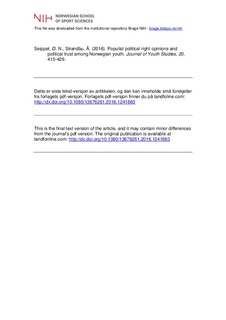| dc.contributor.author | Seippel, Ørnulf | |
| dc.contributor.author | Strandbu, Åse | |
| dc.date.accessioned | 2018-05-23T07:37:10Z | |
| dc.date.available | 2018-05-23T07:37:10Z | |
| dc.date.created | 2016-10-19T11:37:08Z | |
| dc.date.issued | 2017 | |
| dc.identifier.citation | Journal of Youth Studies. 2017, 20, 415-429. | nb_NO |
| dc.identifier.issn | 1367-6261 | |
| dc.identifier.uri | http://hdl.handle.net/11250/2498801 | |
| dc.description | I Brage finner du siste tekst-versjon av artikkelen, og den kan inneholde ubetydelige forskjeller fra forlagets pdf-versjon. Forlagets pdf-versjon finner du på tandfonline.com / In Brage you'll find the final text version of the article, and it may contain insignificant differences from the journal's pdf version. The definitive version is available at tandfonline.com | nb_NO |
| dc.description.abstract | Recent decades have seen the growth of various strands of rightwing populist political orientations, where populism and critique of immigration policies have been central. These ideological developments have caused concern for the legitimacy of social and political institutions. The question explored in this paper, based on Norwegian survey data, is ‘Which types of right political orientations exist among young people, and how do these political attitudes affect trust in social and political institutions?’ The results reveal the existence of both a populist ‘new right’ political orientation similar to the ideology of the Progress Party and a nativist ideology. The new right orientation contains two sets of variables: (i) economic liberalism/state scepticism and (ii) nationalist values. For trust in political institutions, the emerging picture is complex because the nationalist dimension of both the populist orientation and the nativist ideological orientation implies a high level of trust in political institutions. To the extent the new right political orientations causes mistrust, it seems to come from the liberal economic, anti-statist values included in this ideology. Based on these findings, future researchers should distinguish more clearly between the ideological dimensions going into populist political right orientations and the relationship between attitudes and more practical implications of such ideologies. | nb_NO |
| dc.language.iso | eng | nb_NO |
| dc.subject | politics | nb_NO |
| dc.subject | right-wing politics | nb_NO |
| dc.subject | youth | nb_NO |
| dc.subject | trust | nb_NO |
| dc.subject | political socialisation | nb_NO |
| dc.title | Populist political right opinions and political trust among Norwegian youth | nb_NO |
| dc.type | Journal article | nb_NO |
| dc.type | Peer reviewed | nb_NO |
| dc.description.version | acceptedVersion | nb_NO |
| dc.source.pagenumber | 415-429 | nb_NO |
| dc.source.volume | 20 | nb_NO |
| dc.source.journal | Journal of Youth Studies | nb_NO |
| dc.source.issue | 4 | nb_NO |
| dc.identifier.doi | 10.1080/13676261.2016.1241863 | |
| dc.identifier.cristin | 1392876 | |
| dc.description.localcode | Seksjon for kultur og samfunn / Department of Cultural and Social Studies | nb_NO |
| cristin.unitcode | 150,33,0,0 | |
| cristin.unitname | Seksjon for kultur og samfunn | |
| cristin.ispublished | true | |
| cristin.fulltext | postprint | |
| cristin.qualitycode | 1 | |
